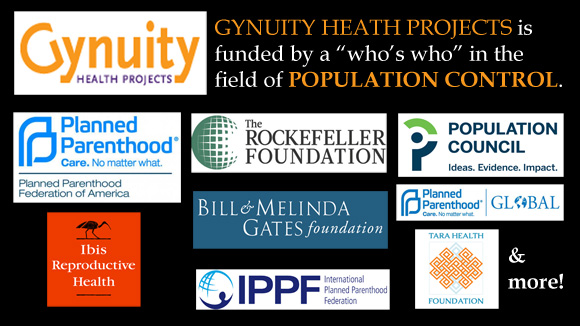An Operation Rescue Investigative Exposé
By Cheryl Sullenger
Last fall, troubling details began to surface of a new study that is testing a new telemedicine delivery system for abortion drugs. Operation Rescue took a look into the new experimental abortion scheme.
Abortions using telemedicine, often referred to as “webcam abortions,” began in 2008 with another experimental program at Planned Parenthood clinics in Iowa. In the traditional webcam abortions, women report to a clinic for an ultrasound then have a consultation with an abortionist at another location via an Internet teleconference. Once approved, the abortionist remotely releases a drawer containing the abortion drugs Mifepristone and Misoprostol. Women then take the first dose in the clinic setting then return home with the rest of the pills, which induce an abortion that resembles a miscarriage.
Webcam abortions have already been banned in 19 states, which all require a licensed physician to be present when abortion-inducing drugs are dispensed.
But instead of dispensing the abortion pills to women at a clinic, this new experimental system does not require women to ever step foot in an abortion office.
So how do the women get the often-dangerous abortion drugs? They are simply dropped into the mail.
Operation Rescue uncovered another disturbing issue with the process. It appears the new scheme has the potential of exploiting free services offered by pro-life pregnancy centers, which would be unwittingly used to help women obtain abortions.
Depopulation agenda
Further research revealed that the experimental program, known as “Telabortion” is the project of Gynuity Health Projects, an international organization fixated on expanding abortion, primarily in third-world countries. It is financed by heavy hitters in the field of depopulation and population control.

Notable backers include:
- The Bill and Melinda Gates Foundation
- The David and Lucile Packard Foundation
- Ibis Reproductive Health
- International Planned Parenthood Federation/Western Hemisphere Region
- The John D. and Catherine T. MacArthur Foundation
- Merck Sharp & Dohme
- Planned Parenthood Federation of America
- Planned Parenthood Global
- Population Council
- Reproductive Health Supplies Coalition
- Society for Family Planning
- Tara Health Foundation
- The Rockefeller Foundation
Gynuity Health Projects’ Telabortion study, which has limited approval by the FDA, began in 2016 and is currently operating in five states: Hawaii, Oregon, Washington State, New York, and Maine.
Participants in the study are:
- Hawaii Women’s Health Research Center (Hawaii)
- Planned Parenthood Columbia Willamette (Washington and Oregon)
- OHSU Women’s Health Research Unit (Washington and Oregon)
- Maine Family Planning (Maine and New York)
The website telabortion.org explains the process, which was confirmed during an undercover phone call placed by an Operation Rescue investigator to Planned Parenthood Columbia Willamette, which is a study participant.
“The process itself more resembles an Internet scam than legitimate health care,” said Operation Rescue President Troy Newman. “And it appears there is a strong eugenics/depopulation agenda behind this. This isn’t about helping women. It is about killing babies as easily and cheaply as possible.”
How it works
Women seeking abortion drugs are referred to a Study Coordinator who evaluates them to ensure they qualify for the study. The qualifications generally include not having an IUD device and not being on blood-thinning drugs. Women must have access to a smart phone with an Internet connection and the ability to obtain required pre-abortion medical services before the 70th day of pregnancy.
When a woman is approved for the study, she is required to obtain certain blood tests and an ultrasound at the provider of her choosing – not necessarily the facility that will be dispensing the abortion drugs. The cost of the lab work and ultrasound examination will be the woman’s responsibility.
She also must download an app to her smart phone that will be used to teleconference with an abortionist. Once the abortionist approves the abortion, the drugs Mifepristone and Misoprostol are sent to her with instructions through the U.S. Mail at an additional cost of $200.00.
Women will also need to stay home for two days and have another person on hand during the abortion process, presumably in case something goes wrong.
Once the abortion is completed, Operation Rescue’s investigator was told there would be no need to report to the Planned Parenthood clinic for follow-up. Costs of any follow up appointment with a legitimate health care provider would also be the responsibility of the women who participate in the study.
Specific questions about follow-up protocols were deflected during the undercover call, and referred to the Study Coordinator.
Red flag for pro-life help centers
The study’s website admits that in some cases, the costs to the woman to participate in the study may be more than the cost of getting abortion drugs from a clinic. Since women must bear the costs of any pre-abortion blood work, a required ultrasound, and follow-up appointments – along with the cost of the abortion pills – it is safe to assume that women will seek the least expensive option for those services.
Women may be tempted to take advantage of free ultrasounds and other services offered by pro-life help centers. This would make pro-life centers that are morally opposed to abortions unwitting participants in the abortion process.

While there were no overt references to prove women are actually being encouraged to seek out pro-life help centers for free ultrasounds, the very real possibility exists that women wishing to limit their out-of-pocket expenses may decide to exploit that option.
Privacy and safety issues
The telabortion.org website warns women that their privacy may be compromised if another person has access to their mail.

Women with children who order the abortion drugs through the mail risk their children intercepting the package. Should a child ingest the drugs, it could place the child at risk.
“The public responds to receiving pro-life postcards in the mail with angry phone calls complaining about the possibility that their children could have been exposed to the mailings. But actual abortion drugs are much more dangerous that a postcard,” said Newman.
Complications
Abortions using the Mifepristone/Misoprostol drug cocktail have a complication rate of around 5-7 percent compared to the surgical complication rate of 0.3 percent that is often cited by the Abortion Cartel.
Operation Rescue has studied complications resulting from abortion-inducing drugs over several years by examining Ohio’s mandatory medication abortion complication reporting forms that must be submitted to the Ohio Department of health each time a complication occurs.
Based on that research, the most common complication is incomplete abortion, which is most often “treated” with a follow-up surgical abortion procedure. Other common complications include severe bleeding (hemorrhage), failed abortions, and infection. Many women suffer more than one complication.
“We have always had safety concerns about women undergoing chemical abortions without adequate supervision and the lack of follow-up,” said Newman. “Webcam abortions are worse because in the event of an emergency, women are forced to seek emergency medical treatment by finding their own way to a nearby hospital. Abortion clinics provide no continuity of care. Abortions by mail are no different.”
Doctor/Patient relationship
In the new Telabortion process, there is essentially no ability to form a doctor/patient relationship. There is no personal contact with the abortionist or the abortion clinic staff. The patient spends a few minutes talking to an abortionist she has never seen before using a smart phone app. The abortionist never again has contact with the patient.
Targeting Americans for abortions
 The targeting of Americans for this experimental abortion pill distribution scheme by population control promoters is especially troubling.
The targeting of Americans for this experimental abortion pill distribution scheme by population control promoters is especially troubling.
“We certainly do not need third-world abortion practices in the U.S.,” said Newman. “We don’t need to kill more babies. We need to have more babies. Children are a blessing and a gift from God. They teach us the value of human life.”
In fact, American birth rates have dropped each year since 2008, according to the Center for Disease Control. Fertility rates have dropped to below replacement levels. A replacement rate of 2.1 is considered minimum for a stable population, but in 2017, that rate dropped to 1.76.
Even radical abortion supporters are now making the argument that America has a problem with a shrinking population, as a means of supporting illegal and unfettered immigration.
“If we would just stop aborting our own children, we wouldn’t have a falling population or a workforce issue,” said Newman. “Abortion has encouraged the problem of illegal immigration, which is being used by the left to undermine our uniquely American culture and attack traditional American Judeo-Christian values. It is attempt to degrade the value life and our uniquely American way of life.”
Another abortion-by-mail program under investigation
A European group, Aid Access, formerly Women on Web, was founded by abortionist Rebecca Gomperts, who is also selling abortion pills to American women on the Internet using a similar scheme to the Telabortion study.
Gomperts is well known pushing the limits on abortion laws in countries around the world. She is best known for her Women on Waves abortion ship that would sail into countries that have restrictions on abortions then take women into international waters where they would be given abortion drugs then returned to port.
Gompert’s version of the abortion-by-mail scheme is certainly not ideal. While it is inexpensive at a cost 80 euros ($91.12), the drugs can take 2-3 weeks for delivery – a long time to wait for an early abortion when the risks of incomplete abortion increase with each passing week.
When complications arise, Aid Access advises women to conceal information about their abortion from their doctors by using deception.
If you think you might have a complication you should go to a doctor immediately. You do not have to tell the medical staff that you tried to induce an abortion; you can tell them that you had a spontaneous miscarriage. Doctors have the obligation to help in all cases and know how to handle a miscarriage.
The FDA has issued warnings about women buying abortion drugs from Aid Access or anyone else over the Internet out of concern for the health and safety of women.
According to a November 5, 2018 CNN report, the FDA is looking into Gompert’s abortion-by-mail scheme for suspected illegality.
The US Food and Drug Administration, however, warns against buying mifepristone over the internet and says consumers who do so bypass distribution safeguards in place to protect them. As a result, the FDA announced in mid-October that it was evaluating the practices of Aid Access “to assess potential violations of U.S. law.”
Conclusion
Laws prohibiting the distribution of abortion drugs through the U.S. mail are very much needed to keep women from being exploited by the unscrupulous and abortionists with a depopulation agenda. The FDA should be advised to not approve the Telabortion program for use in the United States.
“This is not about helping women. It is not even about making a profit, although there is profit to be made in this low-overhead process,” said Newman. “It is really about coming up with a plan to kill as many babies as possible, as cheaply as possible, while having the least interaction with their abortion customers. These people have no concern for women except to make sure they do not reproduce. Their depopulation agenda is appalling and destructive to families and society. The FDA must end this abortion scam now.”





